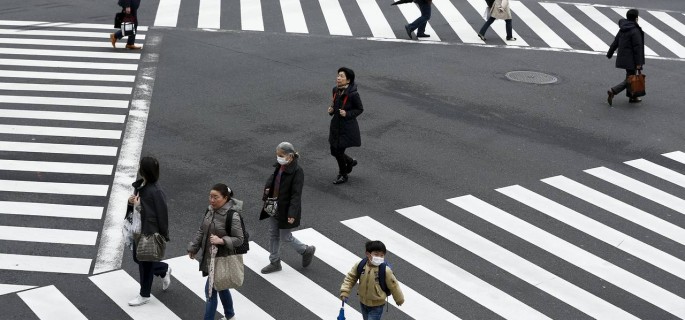Why Japan’s plan to raise the number of lawyers it hasn’t worked out

Japan is struggling with an unlikely problem: Its people aren’t litigious enough.
Fifteen years ago, the nation kicked off a plan to double the number of lawyers. Officials thought they could breathe dynamism into society by mimicking the Western legal system, where courts are more involved in settling issues such as consumer safety and corporate malfeasance.
But Japan’s new lawyers have failed to make a winning argument for why they are needed. The number of regular civil cases filed each year hasn’t budged in a decade. With crime near a record low and bankruptcies plunging, many lawyers are pleading poverty.
“It’s getting a lot harder to make ends meet, no doubt about it,” said Shinichi Sakano, who runs a law firm in Osaka with a partner.
The average income of private attorneys fell to ¥9 million—about $80,000—in 2014 from ¥17.5 million in 2006, according to bar association figures.
The number of applicants to law schools has fallen to one-seventh of the peak. When Japan’s academic year begins April 4, fewer law schools will be welcoming new students than at any time since the current education system was introduced in 2004.
“Fewer people, and especially fewer high-caliber people, are coming to the legal profession,” said Kozo Fujita, former president of Hiroshima High Court, in an internal newsletter for the Japan Bar Association. “This is a very serious problem.”
The move to overhaul Japan’s legal system dates to the collapse in the early 1990s of its stock-market and real-estate bubble—which was blamed in part on opaque regulations and shady business practices. The nation sought to move toward a more market-oriented, rule-based approach.
A government council recommended in 2001 that U.S.-style law schools be established. It called for the number of legal professionals—lawyers, prosecutors and judges—to rise to 50,000 by 2018 from 20,000 at the time.
The plan was duly put into practice and dozens of law schools offering three-year courses opened. The number of newly minted private lawyers each year doubled to about 2,000 a year, to a total of nearly 37,000 now, compared with just over 17,000 in 2000. Even with the new additions, Japan still has far fewer lawyers per capita than the U.S. and major European nations.
Mr. Sakano said the overhaul ignored cultural differences with the U.S., whose law schools served as a model.
“A system that works in a heterogeneous society like the U.S. may not necessarily be suited to Japan,” he said. “Japanese have shown preference for more informal means of resolving disputes, such as through private negotiation mainly between the parties involved.”

Still, even when Japanese people want to go to court, the system continues to put up barriers. Rewards for successful suits tend to be far lower in Japan than in the U.S., both for plaintiffs and their lawyers. Japan doesn’t have contingency fees and hasn’t had a mechanism for class-action suits, although one is set to be introduced this year.
Mr. Sakano said he won a suit against executives of a company over their use of an unauthorized chemical in dumplings sold nationwide but was awarded only about $700,000 in legal fees after eight years of litigation. The money had to be shared between more than 10 lawyers.
What’s more, there are high hurdles to bringing a successful case. Japanese law, based on continental European models, doesn’t include the concept of discovery—making the adversary produce documents or other information—so it is difficult for people suing a corporation to find incriminating evidence.
Meanwhile, lawyers have had difficulty generating business. One bar association tried running 30-second television ads in the style of a samurai drama, with a lawyer in a business suit stepping in at the last minute to rescue a young woman from a deceptive contract. It gave up after a month, saying the ads didn’t work.
About the only kind of cases on the rises are civil family matters such as divorce, child custody and inheritance. Partly this is because of rising disputes over guardianship of elderly people afflicted with dementia, a major problem in a country where more than a quarter of the population is over 65.
The economic hardship has fallen especially hard on newly registered attorneys, said Hiroshi Kawanaka, who led the campaign to increase the number of attorneys in 2002 as vice president of the Federation of Bar Associations. He now says that the pace of increase has been “perhaps too fast.”
“Veteran attorneys argue there are always ways to find new business. But young attorneys disagree. ‘We don’t actually have work. Please look at the reality,’ they say,” Mr. Kawanaka said.
He said, however, that the changes were a step in a right direction. The bar federation points to achievements such as the introduction in 2004 of a jury system for some criminal cases and expanded funding for legal aid.
More work is needed to instill respect for the power of the courts, Mr. Kawanaka said. He observed that parliament continues to give rural regions more voting power in national elections despite repeated warnings from the Supreme Court that the system is in an “unconstitutional state.”
Mr. Sakano, the Osaka lawyer, said he wasn’t optimistic because of Japan’s graying population. “Old people are not very litigious,” he said.
Source: WSJ





























